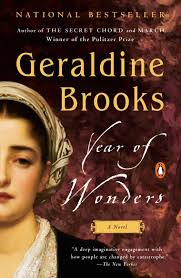Year of Wonders is a novel about about the plague. I was a little worried that the title meant it was gonna be too much bright-siding in the face of disaster.
I’ve unfollowed everyone who’s written any garbage about how the covid quarantine has gifted them with time to hear the birds/smell flowers/really enjoy their daily coffee/etc. Just ugh. You’re allowed to feel shitty in a pandemic, guys, there’s no need to sugar it up for social media. Also if it takes a global pandemic to spend time with your spouse or family members… I mean… maybe capitalism is the virus.
Oops, I got off track. Where was I?
Year of Wonders is about the plague. When the small mining village of Eyam sees the beginning of the black death, the local minister asks the entire village not to go to the relatives and friends, but to stay within in the village boundaries. The neighboring lord sends deliveries of some supplies to an exchange spot at the boundary stone, and occasionally, letters are shouted across the valley, written, and sent. But no one will come in or out until the plague has passed. With one notable exception, the villagers agree to close themselves off for safety.
The plague tests everyone, of course, but the story centers around the town’s minister, his beautiful wife, and their maid Anna. Anna begins as a poor village girl, her desire for learning and knowledge constantly competing with her practicality and awareness of her station. There is a constant brutality even before the plague, from harsh weather, domestic abuse, general violence and poverty. There’s also an ominous religious threat, with a fear of witches (and of being named a witch), flagellation and harsh penance for sins, and a quiet tension between Puritans, Quakers and other Christians.
I couldn’t put this down, even though there are some gross moments, with descriptions of plague symptoms, constant deaths, and the practical questions of how to handle so many corpses. Normally, I need 100% gore-free thrillers, but here, I just had to know what would happen and who would survive. he plague is indiscriminate — I knew our protag Anna wasn’t going to die, of course, but the plague killed off so many other characters, often without a dramatic death scene or any resolution of their story arc. I really felt like no one was safe. I also wanted to know how the people would go one after losing so many villagers, and how they could take up life again.
I was fascinated by this story, and I’d still recommend reading it, but I have to say I found the short final section jolting and confusing. I was glad to know that Anna found happiness, peace, and sunshine, and that she was able to continue her studies, but it was so disconnected from the rest of the story, it almost felt like I accidentally started reading another novel.

